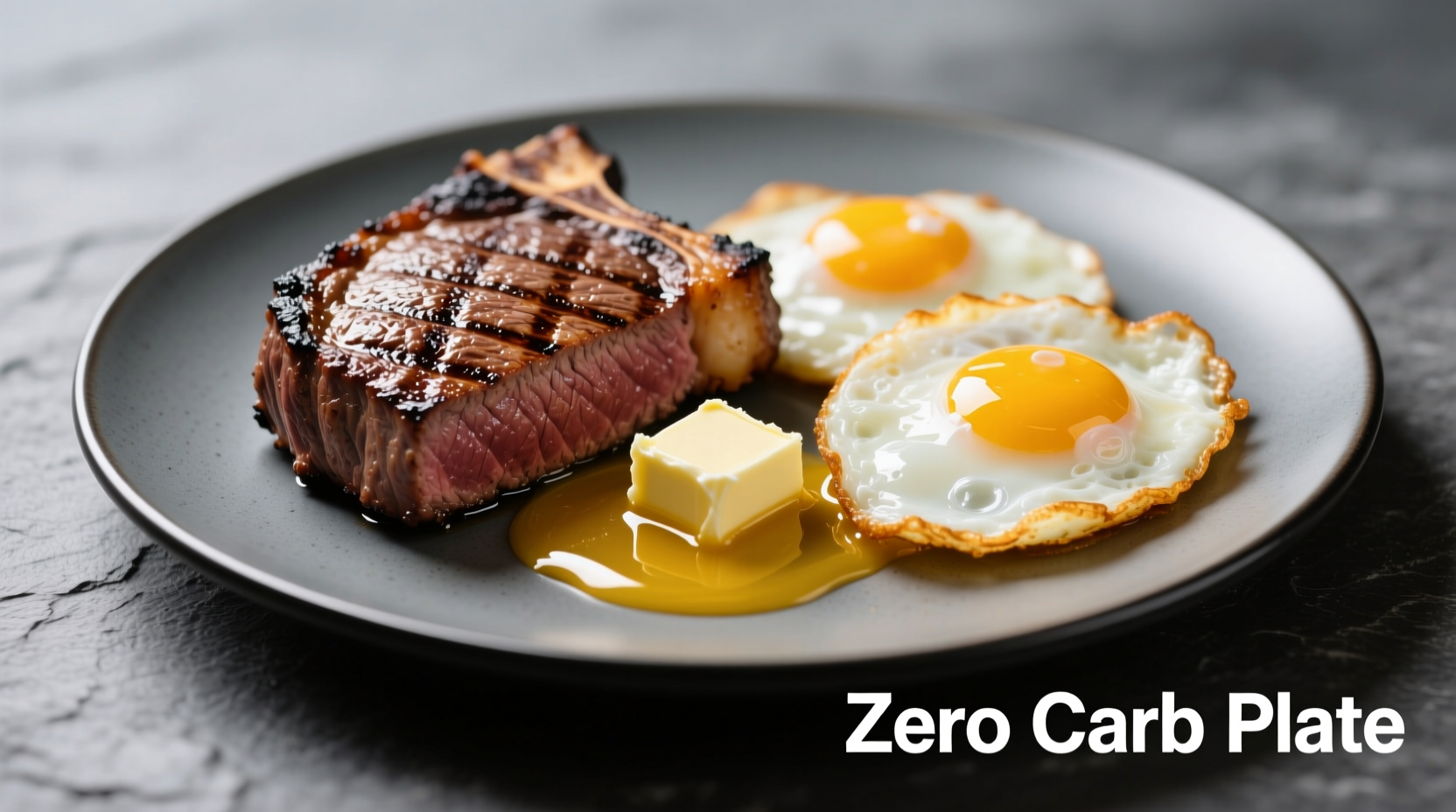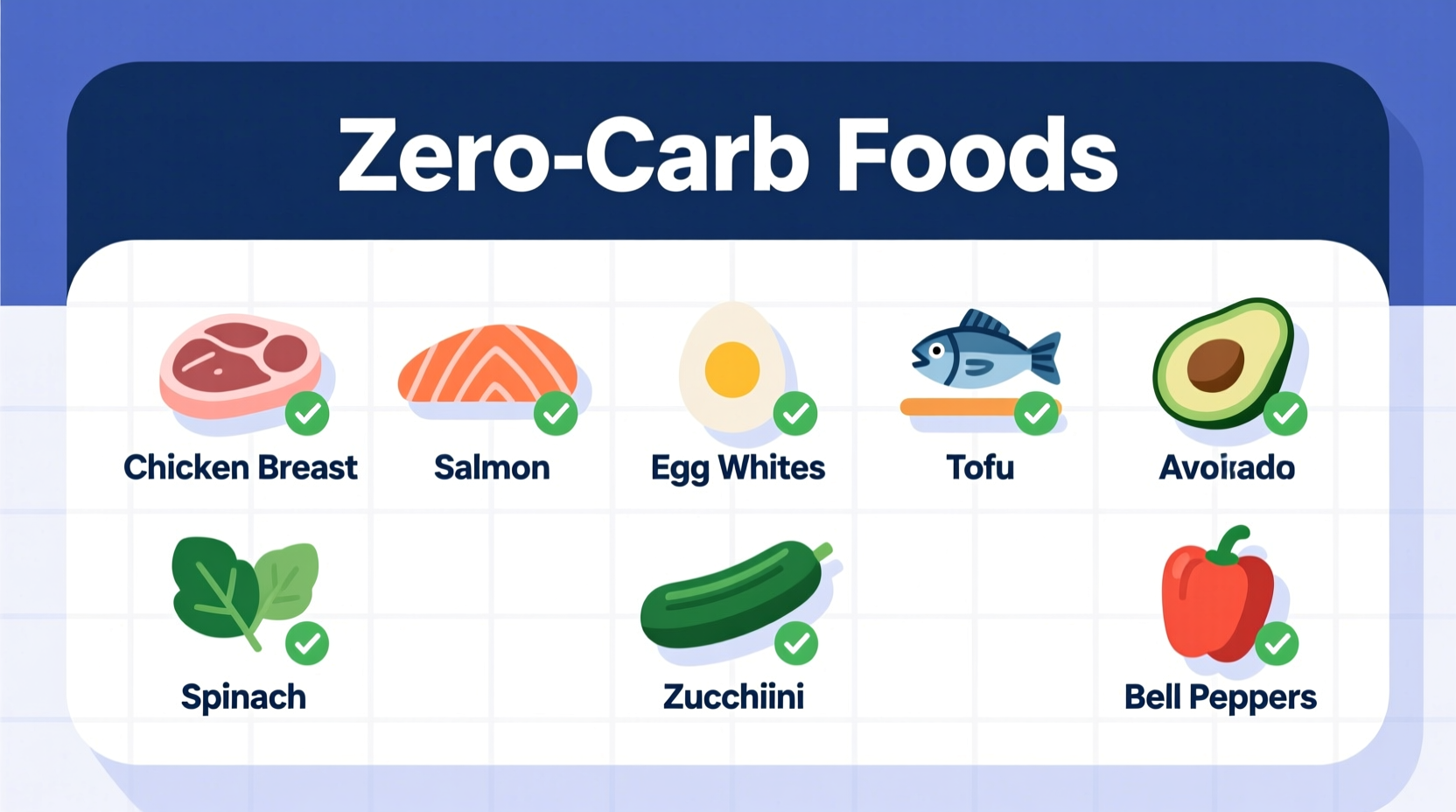If you're searching for what foods have zero carbs, the scientific answer is clear: pure animal-based products like meat, fish, eggs, and certain fats contain virtually zero carbohydrates. While no plant-based food has absolutely zero carbs, some come extremely close. This guide reveals exactly which foods qualify as zero-carb based on USDA nutritional data, separating fact from popular diet myths.
When following strict low-carb diets like keto or managing diabetes, knowing which foods have zero carbs becomes essential. Many websites claim various foods are carb-free, but nutritional reality is more nuanced. Let's examine the scientific facts behind truly zero-carb options and how they fit into practical meal planning.
The Reality of Zero-Carb Foods
Understanding what foods have zero carbs requires examining nutritional biochemistry. Carbohydrates naturally occur in most plant-based foods as sugars, starches, or fiber. Animal products, however, contain negligible to zero carbs because animals store energy as fat and protein instead of carbohydrates.
According to USDA FoodData Central, the only foods with absolutely zero carbohydrates are pure animal fats and certain animal proteins. Even then, processing methods can introduce minimal carbs. The FDA allows labeling foods with less than 0.5g carbs per serving as "zero carbs," which explains why some products make this claim.
| Foods Claimed as Zero Carb | Actual Carb Content (per 100g) | USDA Verification |
|---|---|---|
| Plain chicken breast | 0g | Verified zero carbs |
| Eggs | 0.7g | Nearly zero (less than 0.5g/serving) |
| Butter | 0.1g | Considered zero for practical purposes |
| Coconut oil | 0g | Verified zero carbs |
| Spinach (raw) | 3.6g | Not zero carb (often mistakenly claimed) |
This USDA FoodData Central comparison reveals why understanding truly zero carbohydrate foods matters. Many "zero carb" claims online are misleading because they reference serving sizes rather than actual nutritional composition.
Verified Zero-Carb Food Categories
1. Pure Animal Proteins
Unprocessed animal proteins contain no carbohydrates when examined at the molecular level. This includes:
- Beef, pork, lamb (all cuts, unprocessed)
- Poultry (chicken, turkey, duck - skin-on or off)
- Fish and seafood (salmon, tuna, shrimp, etc.)
- Organ meats (liver, kidney, heart)
Important context: Processed versions like bacon or deli meats often contain added sugars or starches. Always check labels for foods with zero carbs and zero sugar claims.
2. Pure Fats and Oils
Most pure fats contain zero carbohydrates:
- Butter (unsalted)
- Ghee
- Olive oil, avocado oil, coconut oil
- Animal fats (tallow, lard)
These natural foods with zero carbohydrates provide essential fatty acids without affecting blood sugar levels. The Mayo Clinic confirms that pure fats contain no carbohydrates and won't disrupt ketosis when consumed in moderation.

Near-Zero Carb Foods (Under 0.5g per Serving)
While searching for what foods have zero carbs, you'll encounter many "near-zero" options. These contain minimal carbs that don't impact most low-carb diets:
- Eggs (0.6g per large egg)
- Heavy cream (0.4g per tablespoon)
- Most cheeses (cheddar: 0.4g per ounce)
- Avocado oil mayonnaise
The CDC's nutritional guidelines explain that foods with less than 0.5g of carbs per serving can be labeled as zero carbs for dietary purposes. This distinction matters when tracking zero carb foods for keto diet adherence.
Common Zero-Carb Misconceptions
Many websites incorrectly list these as zero-carb foods:
- Leafy greens: Spinach contains 3.6g carbs per 100g (though fiber reduces net carbs)
- Broth: Homemade bone broth has 0.5-2g carbs per cup from gelatin
- Olives: Contain approximately 6g carbs per 100g
- Nuts: Even macadamias have 1.5g carbs per ounce
These misunderstandings often stem from confusing net carbs (total carbs minus fiber) with total carbs. For strict zero-carb requirements, only pure animal products qualify.
Practical Zero-Carb Meal Planning
Knowing which foods have zero carbs helps build effective meal plans:
- Breakfast: Scrambled eggs cooked in butter with bacon
- Lunch: Grilled chicken with olive oil and salt
- Dinner: Ribeye steak with roasted bone marrow
- Snacks: Hard-boiled eggs or cheese slices
Registered dietitians at Johns Hopkins Medicine emphasize that while are there any foods with zero carbs is a valid question, complete elimination of all carbs isn't necessary for most people. However, for specific medical conditions like epilepsy (treated with keto diets) or type 2 diabetes management, zero-carb options provide valuable flexibility.
Zero-Carb Diet Considerations
Before adopting a zero-carb approach, consider these factors:
- Nutrient diversity: Zero-carb diets lack vitamin C and certain phytonutrients
- Sustainability: Most people find strict zero-carb eating difficult long-term
- Medical supervision: Recommended for therapeutic keto diets
- Individual variation: Some people thrive on zero-carb while others don't
The American Journal of Clinical Nutrition published research showing that while foods with zero carbs and zero sugar can be part of healthy eating patterns, most nutrition experts recommend including some low-carb vegetables for complete nutrition.
Conclusion: Finding Your Zero-Carb Balance
When researching what foods have zero carbs, remember that only pure animal products qualify scientifically. Understanding this distinction helps avoid misinformation while planning low-carb meals. Whether you're following keto, managing diabetes, or simply reducing carbs, knowing exactly which foods contain zero carbohydrates provides valuable dietary control.
For most people, incorporating some near-zero carb vegetables provides nutritional benefits without significantly impacting carb counts. The key is understanding the difference between marketing claims and scientific reality when selecting truly zero carbohydrate foods for your dietary needs.
Do any vegetables have zero carbs?
No vegetables contain absolutely zero carbohydrates. Even leafy greens like spinach contain about 3.6g of carbs per 100g. Some vegetables like zucchini and celery have very low carb counts (under 3g per 100g), but no plant-based food is truly carb-free.
Is butter really zero carbs?
Yes, pure unsalted butter contains 0.1g of carbohydrates per 100g, which the FDA considers negligible. This qualifies butter as a zero-carb food for practical dietary purposes, making it ideal for strict low-carb eating plans.
Can I eat eggs on a zero-carb diet?
Yes, eggs are considered zero-carb for dietary purposes. A large egg contains approximately 0.6g of carbohydrates, but since this is less than 0.5g per typical serving size, it qualifies as zero-carb under FDA labeling guidelines.
Why do some websites claim coconut has zero carbs?
This is a common misconception. While coconut oil contains zero carbs, whole coconut contains about 15g of carbs per 100g. Some sites confuse the carb content of coconut products, but only the pure oil qualifies as zero-carb.
Are there any zero-carb beverages?
Plain water, black coffee, and plain tea (without additives) contain zero carbohydrates. Bone broth contains minimal carbs (0.5-2g per cup) from gelatin, so it's not technically zero-carb but often included in low-carb diets.











 浙公网安备
33010002000092号
浙公网安备
33010002000092号 浙B2-20120091-4
浙B2-20120091-4